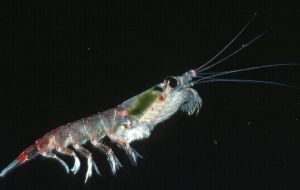MercoPress. South Atlantic News Agency
Rising sea temperature will reduce krill growth habitat in Antarctica
 Dr. Simeon Hill, a marine biologist at BAS, said krill grow faster in cold
Dr. Simeon Hill, a marine biologist at BAS, said krill grow faster in cold Antarctic krill are usually less than 6 cm in length, but their size belies the major role they play in sustaining much of the life in the Southern Ocean. They are the primary food source for many species of whales, seals, penguins and fish.
Krill are known to be sensitive to sea temperature, especially in the areas where they grow as adults. This has prompted scientists to try to understand how they might respond to the effects of further climate change.
Using statistical models, a team of researchers from the British Antarctic Survey and Plymouth Marine Laboratory assessed the likely impact of projected temperature increases on the Weddell Sea, Scotia Sea and Southern Drake Passage, which is known for its abundance of krill.
This region, has experienced sea surface, warming of as much as 1°C over 50 years.
Projections suggest this could rise by another 1°C by the end of the 21st century.
The models are based on equations which link krill growth, sea surface temperature, and food availability. An analysis of the results, published this week in the online journal PLOS ONE, suggests warming, if continued, could reduce the area of growth habitat by up to 20%.
In the early life stages krill require deep water with low acidity and a narrow range of temperatures for their eggs to successfully hatch and develop. The larvae then feed on algae on the underside of sea ice.
The adults require suitable temperatures and enough of the right type of food (larger phytoplankton) to successfully grow and reproduce. Many of these critical environmental features (temperature, acidity, sea-ice and food availability) could be affected by climate change.
However the projected effects of warming are not evenly spread.
South Georgia is located within the area likely to be worst affected. Here the reduction in krill habitat could be as much as 55%. The island is home to a range of animals such as fur seals and Macaroni penguins that depend upon krill, and others, such as Black-browed Albatrosses, which eat substantial amounts of krill as well as fish and squid. The researchers say animals which don’t travel far to forage, such as fur seals, would be most affected by the projected changes.
Krill is also being commercial commercially fished, although there is nothing to suggest current levels are unsustainable. In fact, at less than one per cent of estimated biomass, catches are much lower than most other commercial fisheries.
But, the Antarctic krill fishery took 68% of its total catch between 1980 and 2011 from the area of projected habitat degradation.
The scientists suggest improved management systems to ensure the fisheries take into account both growing demand for catches and climate change.
Lead author, Dr. Simeon Hill, a marine biologist at BAS, said: “Each year, growth of Antarctic krill in the Southern Ocean produces new material that weighs twice as much as all the sugar produced in the world.
“Krill grow fastest in cold water and any warming can slow down or stop growth, reducing the food available for wildlife. Our research suggests that expected warming this century could severely reduce the area in which krill can successfully grow.”
Although there is evidence that warming seas pose a threat to Antarctic krill habitats the team of researchers believe this can be mitigated with effective fisheries management systems in place. (PN).





Top Comments
Disclaimer & comment rules-

-

-

Read all commentsEurope, China, Japan, North America, India's fault. Nuke em and problem solved, no more “global Warming”.
Aug 26th, 2013 - 10:37 am 0Everybody at fault except Argentina, you talk bollocks, anyway you ndo not have nuclear capability, numbnuts
Aug 26th, 2013 - 12:54 pm 0@1 Poor gringe. Where are the British undersea bases? Are they in the Falklands, South Georgia, the South Sandwich Islands, the British Antarctic Territory.? Will missiles launch from unsuspected locations? Poor little argieland with no nukes. Probably not a good idea to obstruct Britain. You little shit.
Aug 26th, 2013 - 01:33 pm 0Commenting for this story is now closed.
If you have a Facebook account, become a fan and comment on our Facebook Page!